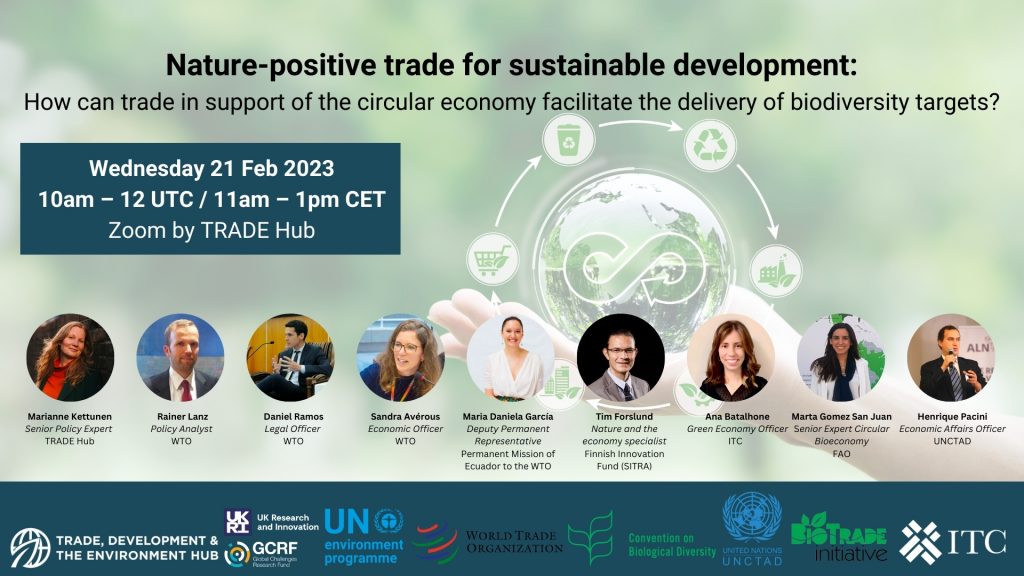This webinar, the third to be held at part of the Nature-positive trade webinar series, will explore how trade-related policies and measures can support the implementation of the Kunming-Montreal Global Biodiversity Framework. The webinar will be held in the week before the 13th WTO Ministerial Conference.
Date: Wed 21 Feb 2023
Time: 10am – 12 UK / 11am – 1pm CET
Location: Zoom
Target 7 of the Kunming-Montreal Global Biodiversity Framework, adopted at the COP 15 of the Convention on Biological Diversity, calls for reduction of pollution from all sources (e.g. nutrients, chemicals, pesticides), and preventing, reducing, and working towards eliminating plastic pollution. Interlinked with this, Target 16 speaks to the reduction of the global consumption footprint and overconsumption, and reducing waste generation (e.g. food waste).
Circular economy is a common nominator in helping to achieve both of these targets. Waste prevention is at the core of the circular economy, with circular approaches and methods ensuing the use of waste as secondary raw material. Such approaches and methods can also be used to eliminate pollution, such as the release of excess nutrients to ecosystems, in agriculture, forestry and aquaculture sectors. In general, a shift to the circular economy is considered as a key means to reduce the global consumption footprint and help to reduce the pressures on ecosystems and biodiversity.
Trade-related policies and measures can play an important role in supporting the delivery of Targets 7 and 16, including through supporting circular economy. For example, trade measures can contribute to reducing pollution by regulating plastics trade and in doing so reducing risks to plastic pollution. Trade policy can also support the removal of trade-distorting subsidies linked to the unsustainable use of fertilizers and agrochemicals, leading to the reduction of agricultural pollution. Furthermore, trade can support sustainable consumption and reduction of waste through facilitating trade in resource efficient circular products and services that are also “nature-positive” and contribute to reducing pressures on biodiversity (e.g. reduce extraction of primary raw materials). Trade measures can also be used to restrict and regulate trade in waste that cannot be managed in an environmentally sustainable manner in recipient countries. Finally, trade-related measure – such sustainability standards, disclosures and labelling – can be used to ensure that imported and exported products can be recycled or disposed of safely in their final destination.
The aim of this webinar is to identify and discuss some key trade-related policies and measures that can contribute to pollution and waste reduction, and facilitate the uptake of circular practices, supporting the delivery of Target 7 and Target 16 objectives for both biodiversity and people. This webinar will be held in the week before the 13th WTO Ministerial Conference, in which a ministerial statement on results from the Plastics Pollution dialogue is expected.
